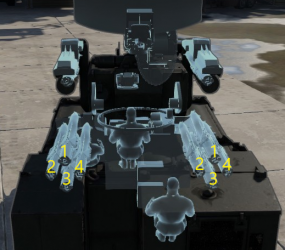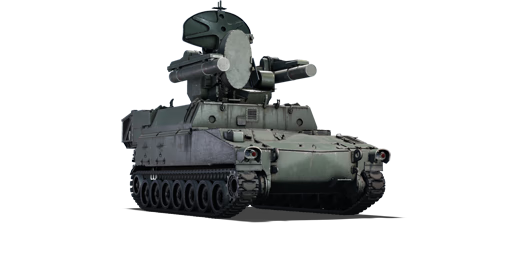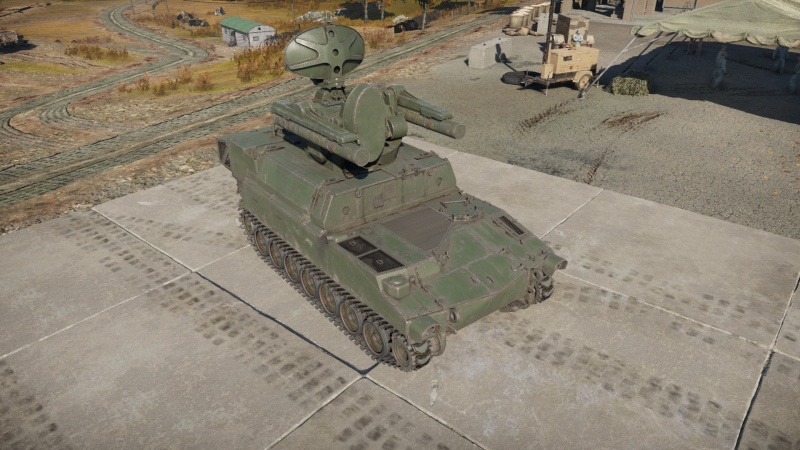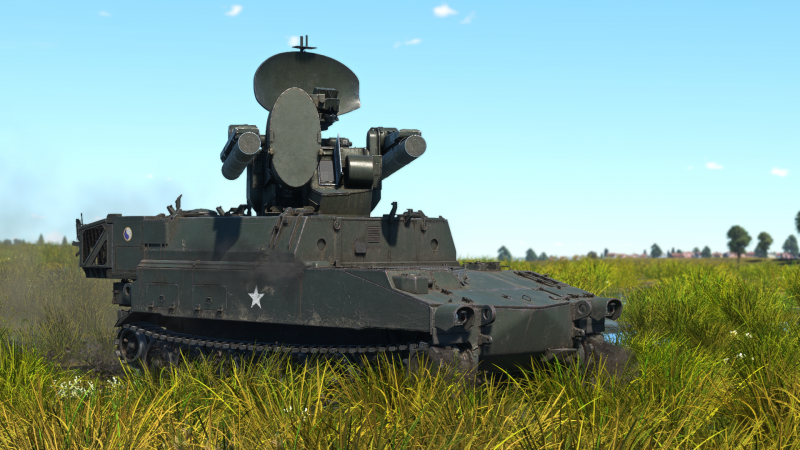Difference between revisions of "XM975"
Colok76286 (talk | contribs) (Edits) |
m (Added a new Specs-Card thumbnail) |
||
| Line 1: | Line 1: | ||
{{Specs-Card | {{Specs-Card | ||
|code=us_xm_975_roland | |code=us_xm_975_roland | ||
| − | |images={{Specs-Card-Image|GarageImage_{{PAGENAME}}.jpg}} | + | |images={{Specs-Card-Image|GarageImage_{{PAGENAME}}.jpg|ArtImage_{{PAGENAME}}.png}} |
}} | }} | ||
Revision as of 12:18, 13 October 2022
Contents
Description
The XM975 is a rank VII American SPAA with a battle rating of 10.0 (AB) and 10.3 (RB/SB). It was introduced in Update "Winged Lions".
It is an American prototype SAM system, mounting the French Roland missile as its primary weapon.
General info
Survivability and armour
The XM975 has similar protection to other SPAAs and SAMs of its rank, with enough protection to stop some splash damage from near misses of small rockets and bombs. The armour will also stop rifle-calibre rounds, but the American M2HB Browning, the Soviet NSVT, or other similar heavy machine guns will slice straight through the armour, along with of course any MBT round. Avoid direct confrontation with all enemy ground forces.
Armour type:
- Rolled homogeneous armour (turret, hull rear)
- Aluminium alloy 5083 (hull)
| Armour | Front (Slope angle) | Sides | Rear | Roof |
|---|---|---|---|---|
| Hull | 32 mm Top 32 mm (30-75°) Upper glacis 32 mm (0-59°) Lower glacis |
32 mm (24°) Top 32 mm Bottom |
6.35 mm Top 32 mm Bottom |
32 mm |
| Turret | 15 mm | 15 mm | 15 mm | 10 mm |
Notes:
- Tracks are 20 mm thick, suspension wheels are 15 mm thick
Mobility
The top speed of 57 km/h (35.4 mph) is reasonably quick. The XM975 is capable of traversing the map relatively quickly, though it is recommended to travel in mostly straight lines if possible. The acceleration is mediocre and it will take time for the vehicle to regain speed again, so attempt to avoid many turns and take roads when able.
| Game Mode | Max Speed (km/h) | Weight (tons) | Engine power (horsepower) | Power-to-weight ratio (hp/ton) | |||
|---|---|---|---|---|---|---|---|
| Forward | Reverse | Stock | Upgraded | Stock | Upgraded | ||
| Arcade | 62 | 13 | 24.8 | 575 | 773 | 23.19 | 31.17 |
| Realistic | 57 | 12 | 358 | 405 | 14.44 | 16.33 | |
Modifications and economy
The modification order is fairly simple for the XM975. Parts and FPE should come first as usual, then the Roland 3. This will increase the engagement range of the XM975 from 6.3 km to 8 km and allow engagement of most enemy helicopters. Then horizontal drive, airstrike and elevation mechanism, to allow for better tracking of fast moving enemy aircraft and a reduction to the spawn cost of allied aircraft. After that, mobility modifications, crew replenishment and finally improved optics.
Armaments
Main armament
| Roland missile | Turret rotation speed (°/s) | Reloading rate (seconds) | |||||||||||
|---|---|---|---|---|---|---|---|---|---|---|---|---|---|
| Mode | Capacity (Belt) | Vertical | Horizontal | Stabilizer | Stock | Upgraded | Full | Expert | Aced | Stock | Full | Expert | Aced |
| Arcade | 10 (2) | -10°/+80° | ±180° | N/A | 74.9 | 103.6 | 125.8 | 139.1 | 148.0 | 5.00 | 5.00 | 5.00 | 5.00 |
| Realistic | 50.6 | 59.5 | 72.3 | 79.9 | 85.0 | ||||||||
Ammunition
| Penetration statistics | |||||||
|---|---|---|---|---|---|---|---|
| Ammunition | Type of warhead |
Penetration @ 0° Angle of Attack (mm) | |||||
| 10 m | 100 m | 500 m | 1,000 m | 1,500 m | 2,000 m | ||
| Roland 1 | SAM | 39 | 39 | 39 | 39 | 39 | 39 |
| Roland 3 | SAM | 54 | 54 | 54 | 54 | 54 | 54 |
| Shell details | ||||||||||
|---|---|---|---|---|---|---|---|---|---|---|
| Ammunition | Type of warhead |
Velocity (m/s) |
Range (m) |
Projectile Mass (kg) |
Fuse delay (m) |
Fuse sensitivity (mm) |
Explosive Mass (TNT equivalent) (g) |
Ricochet | ||
| 0% | 50% | 100% | ||||||||
| Roland 1 | SAM | 500 | 6,300 | 65 | 0 | 0.1 | 4,590 | 79° | 80° | 81° |
| Roland 3 | SAM | 575 | 8,000 | 77 | 0 | 0.1 | 6,810 | 79° | 80° | 81° |
Ammo racks

| Full ammo |
1st rack empty |
2nd rack empty |
3rd rack empty |
4th rack empty |
Visual discrepancy |
|---|---|---|---|---|---|
| 5 | 4 (+1) | 3 (+2) | 2 (+3) | 1 (+4) | No |
Usage in battles
When using the XM975, attempt to stay focused on the air threats. As a SAM platform, there are very few ground vehicles that can be knocked out by the Roland missile, so it is better to find a concealed position and avoid contact with enemy armour. The XM975 does have an advantage over quite a few other anti-air vehicles, thanks to the IRST (infrared search and track) mode. Commanders of the XM975 should be aware of this mode, as it prevents detection of lock-on by the enemy aircraft's RWR. The IRST mode also ignores enemy chaff, and is generally just a better mode to operate in as a whole.
The Roland is a relatively slow missile, so it is not recommended to fire upon jets that are near the limit of the missile's range and/or fly at high speed. However, this is made up for by the high manoeuvrability of the missile, as the slower speed allows it to pull sharper turns than quicker SAM missiles. Helicopters are usually within range, as all helicopters armed with the AGM-114 Hellfire will be within engagement range, as the maximum range of the hellfire is 8 km, like the Roland 3. Some helicopters may outrange the Roland in uptiers, such as the Ka-50 or Ka-52 with the 9K 127 Vikhr missiles. It is recommended to immediately take cover if outside engagement range, although it is possible to proximity fuse the Vikhr with the Roland if there is no other option available.
Pros and cons
Pros:
- Roland SAMs are quite manoeuvrable compared to other SAMs around the BR
- Can take down aircraft and choppers up to 8.0 km (4.97 mi) with the Roland 3
- SACLOS-guided SAMs are much harder to defeat compared to IR-guided SAMs
Cons:
- Lacklustre armour and high profile makes the XM975 vulnerable to enemy fire
- Roland missiles are slower than later SAMs and fairly easy to spot
- No anti-aircraft cannons as backup once all missiles are expended or for use against close-range/ground targets
History
Describe the history of the creation and combat usage of the vehicle in more detail than in the introduction. If the historical reference turns out to be too long, take it to a separate article, taking a link to the article about the vehicle and adding a block "/History" (example: https://wiki.warthunder.com/(Vehicle-name)/History) and add a link to it here using the main template. Be sure to reference text and sources by using <ref></ref>, as well as adding them at the end of the article with <references />. This section may also include the vehicle's dev blog entry (if applicable) and the in-game encyclopedia description (under === In-game description ===, also if applicable).
Media
Excellent additions to the article would be video guides, screenshots from the game, and photos.
See also
Links to the articles on the War Thunder Wiki that you think will be useful for the reader, for example:
- reference to the series of the vehicles;
- links to approximate analogues of other nations and research trees.
External links
Paste links to sources and external resources, such as:
- topic on the official game forum;
- other literature.
| USA anti-aircraft vehicles | |
|---|---|
| M3 Half-track derivatives | M13 MGMC · M15 CGMC · M16 MGMC |
| M24 derivative | M19A1 |
| M41 derivative | M42 |
| Radar SPAAG | M163 · M247 |
| Missile SPAA | ADATS · Imp.Chaparral · LAV-AD · XM975 |






